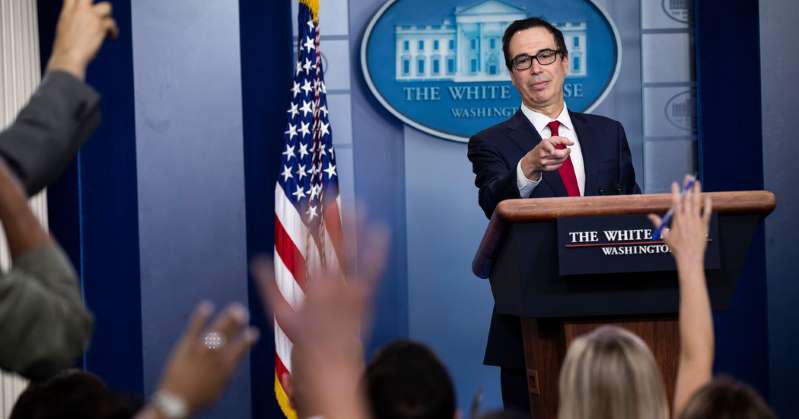By Annie Karni, New York Times–
When President Trump defended neo-Nazi protesters in Charlottesville, Va., in 2017, one of his top aides took the rare step of publicly condemning what he said.
Gary D. Cohn, who served as his top economic adviser at the time, said in an interview with The Financial Times that “this administration can and must do better in consistently and unequivocally condemning these groups.”
On Monday, Mr. Cohn’s successor in the West Wing, Larry Kudlow, steered clear of the latest flare-up of Mr. Trump’s inflammatory language.
“That’s way out of my lane,” Mr. Kudlow said when asked about the president’s weekend tweets, in which he said four Democratic congresswomen of color should “go back” to the countries they came from — even though three of them were born in the United States and all four are American citizens.
“He’s tweeted what he’s tweeted,” Mr. Kudlow said. “You’ll have to talk to him about that.”
Almost two years after Charlottesville, when Mr. Trump refused to condemn white supremacists after their deadly clash with a crowd protesting them, presidential statements widely condemned as racist are still putting White House officials in the awkward position of having to defend comments they privately wish Mr. Trump had not made.
But they are also causing less heartburn in the West Wing than they used to.
After Charlottesville, Ivanka Trump, the president’s daughter and a White House adviser, issued her own statement on Twitter, saying there was “no place in society for racism, white supremacy and neo-nazis.” It was a notable corrective to her father.
On Monday, Ms. Trump declined to comment on her father’s latest remarks, which even some Republican lawmakers called “racist and xenophobic” and said demanded an apology.
Steven Mnuchin, the Treasury secretary, who was giving an unrelated briefing on cryptocurrencies on Monday, could not so easily avoid being asked about Mr. Trump’s tweets. “I do not find them racist,” he told reporters, but he added that the president “speaks for himself on that.” Mr. Mnuchin had also defended Mr. Trump’s comments about Charlottesville.
When asked if Mr. Trump’s tweets were racist, Kenneth T. Cuccinelli II, the acting director of United States Citizenship and Immigration Services, said on CNN: “No, I see that as presumably political hand grenades.”
Rudolph W. Giuliani, the president’s personal lawyer, was similarly dismissive of the idea that the attack on the congresswomen was racist. “He’s just pointing out that all they ever seem to do is attack America,” he said.
And Marc Short, chief of staff to Vice President Mike Pence, said Mr. Trump’s “intent” was not “in any way racist.” Mr. Short pointed to the fact that an Asian immigrant, Elaine Chao — who also happens to be married to Mitch McConnell, the Senate majority leader — serves in the president’s cabinet as transportation secretary. “This is not a universal statement that he’s making,” Mr. Short said. “He’s making it about an individual member of Congress.”
Neither the White House press secretary, Stephanie Grisham, nor one of Mr. Trump’s most visible television defenders, Kellyanne Conway, weighed in on Monday. And other White House officials acknowledged privately that Mr. Trump’s statements were difficult to defend.
But in interviews with a half-dozen current and former White House officials, many said Mr. Trump’s comments, which relied on an age-old taunt to further an us-against-them political strategy Mr. Trump hopes to ride into his re-election, did not at a “gut level” rise to the level of the Charlottesville crisis, in which one protester was killed. After that incident, Mr. Cohn even drafted a resignation letter, though he ultimately did not submit it to Mr. Trump.
More frustrating to many internally, they said, was that Mr. Trump interrupted an intraparty Democratic fight between Speaker Nancy Pelosi and the freshman congresswomen known as “the squad” by uniting them against a common enemy in the White House.
Administration veterans said they had long ago become immune to thinking anything Mr. Trump said would stick to him for more than one news cycle. Indeed, even a year after Charlottesville, Republican lawmakers who distanced themselves from the president had come back to embrace his tax overhaul and his selection of Brett M. Kavanaugh for the Supreme Court.
And many of the corporate executives who quit Mr. Trump’s business councils in protest have since dined privately with Mr. Trump at the White House. Mr. Trump’s poll numbers, meanwhile, have remained steadily in the low to mid-40s, showing no prolonged drop-off because of any particular crisis.
Two former White House officials also claimed that on the subject of the Democratic congresswomen of color, the truth was that many Americans agreed with Mr. Trump. One campaign official said that if Mr. Trump succeeded in forcing Democrats to embrace as progressive leaders members like Representative Ilhan Omar of Minnesota, whose remarks her own party has sometimes struggled to defend, it could hurt them.
Mr. Trump trained his criticism specifically on Ms. Omar on Monday when he defended his weekend tweets.
“I hear the way she talks about Al Qaeda,” Mr. Trump told reporters on the South Lawn. “When she talked about the World Trade Center being knocked down by ‘some people.’” Mr. Trump said that “these are people that in my opinion hate our country. Now you can say what you want, but get a list of all of the statements they have made. And all I’m saying: that if they are not happy here, they can leave.”
If his staff was not eager to publicly defend Mr. Trump, he showed on Monday that he was happy to do it himself. When asked whether it was worrisome that many people viewed his tweets as racist, Mr. Trump said that “it doesn’t concern me because many people agree with me.”


Leave A Comment
You must be logged in to post a comment.